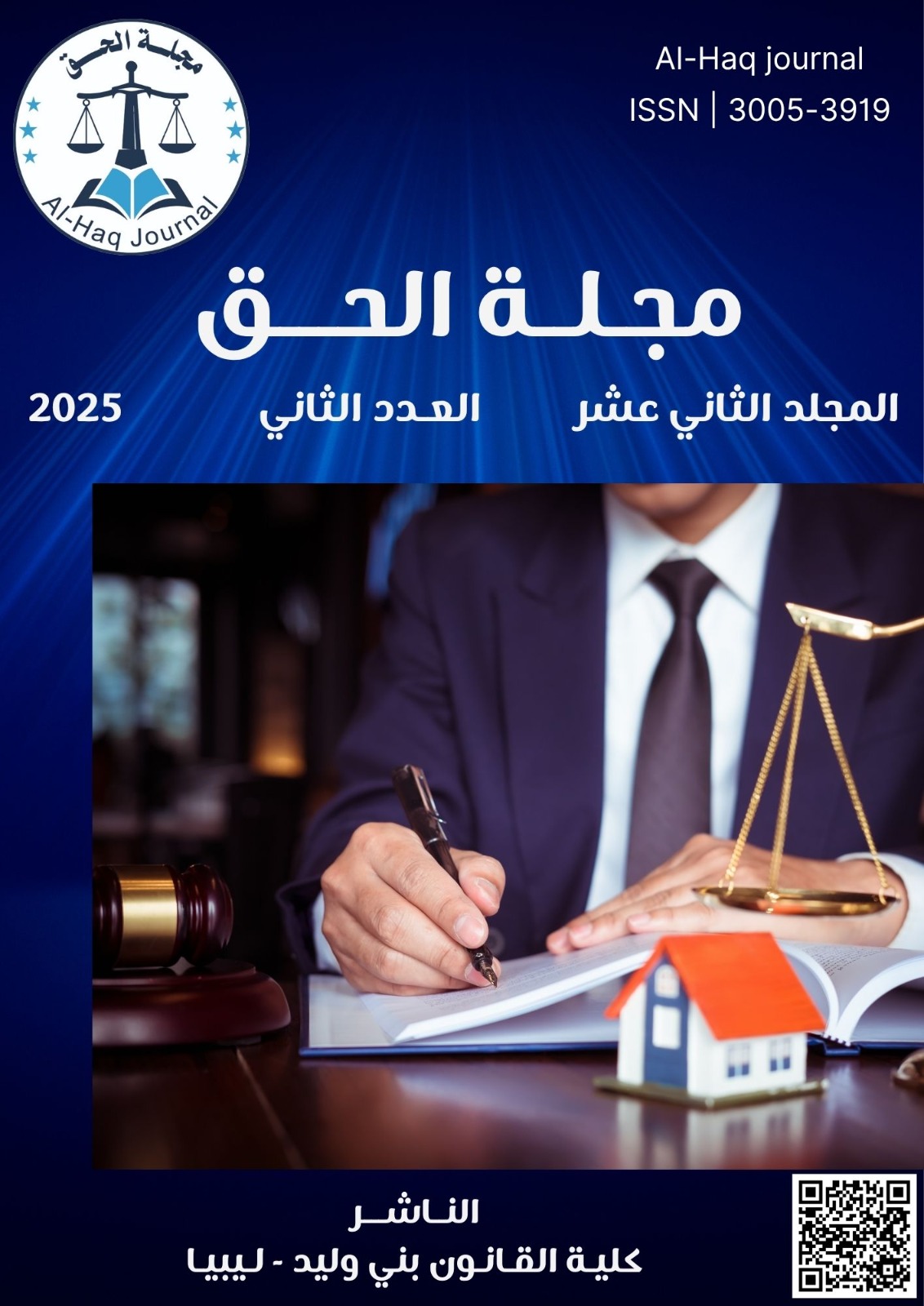Judge Al-Baydawi's choices in citing the actual Sunnah as evidence, from his book "Al-Minhaj" (A Fundamental Study)
DOI:
https://doi.org/10.58916/alhaq.v12i2.377Keywords:
Judge Al-Baydawi, the continuous report, the science of the principles of jurisprudence, evidence, the actual SunnahAbstract
This research deals with Judge Al-Baydawi's choices in inferring from the actual Sunnah, focusing on his approach in his book "Al-Minhaj", as Judge Al-Baydawi is considered one of the most prominent scholars of the principles of jurisprudence. In his book, he demonstrated precision and rigor in dealing with legal evidence. It becomes clear from studying "Al-Minhaj" that Al-Baydawi did not accept any action attributed to the Prophet, may God bless him and grant him peace, as legislative evidence in an absolute manner. Rather, he distinguished between different types of actions. He believed that actions issued by the Prophet, may God bless him and grant him peace, by way of general legislation (worship) are considered evidence, while actions related to human or natural customs or those issued for a specific reason are not considered evidence in themselves unless there is other evidence of their legislation. He was also concerned with the context and circumstances of the prophetic action, and distinguished between what was specific to the Prophet, may God bless him and grant him peace, and what was general to the nation. This study demonstrates that Al-Baydawi's approach was based on scrutiny and examination, and emphasizes the importance of understanding the actual Sunnah within its correct framework, far from superficial reasoning, which makes him a model to be emulated in the research of the principles of jurisprudence.
Downloads
References
/البحر المحيط للزركشي , دار الكتب ,ط1 سنة1414ه, 1994م
/المحصول للرازي , طه جابر فياض العلواني , ط3 سنة : 1418ه 1997م
/إرشاد الفحول للشوكاني , محمد سعيد البدري , د.ط , سنة : 1412ه 1992م , أحمد عزو عناية
/التعريفات الفقهية , محمد عميم الإحسان المجددي البركتي , دار الكتب العلمية ,ط1 سنة 1424ه 2003م
/المستصفى للغزالي , محمد عبدالسلام عبدالشافي , دار الكتب العلمية , ط1 سنة : 1413ه 1993م
/متن منهاج الوصول إلى علم الأصول , تيسير إبراهيم ,د.ط , د. ت , كلية الشريعة والقانون الجامعة الإسلامية –غزة , 1429ه 2008م
/نهاية السول شرح منهاج الوصول للإسنوي , دار الكتب العلمية , بيروت لبنان , ط1 سنة : 1420ه 1999م
/منهاج الوصول إلى علم الأصول للبيضاوي , شعبان محمد , دار ابن حزم , ط1 سنة : 1429ه 2008م
/القاموس المحيط , محمد نعيم العرقسوسي , مؤسسة الرسالة للطباعة والنشر والتوزيع , بيروت لبنان , ط8 سنة :1426ه 2005م
/المصباح المنير , احمد بن محمد بن علي المقري الفيومي , المكتبة العلمية بيروت
/أصول السرخسي , دار المعرفة - بيروت
/توثيق السنة في القرن الثاني الهجري أسسه واتجاهاته , رفعت بن فوزي عبد المطلب , ط1, د.ت , مكتبة الخنانجي بمصر
/شرح نخبة الفكر , ابن حجر العسقلاني , شرحه عبدالكريم بن عبدالله بن عبدالرحمن بن حمد الخضير
/أصول الفقه , محمد أبو النور زهير , المكتبة الأزهرية للتراث
/معجم البدع , دار العاصمة لِلنَّشْرِ وَالتَّوزيع , ط1 سنة : 1417 هـ - 1996 م
/المهذب في علم أصول الفقه المقارن , عبدالكريم النملة , مكتبة الرشد –الرياض , ط1 سنة : 1420ه 1999م
/الاحكام للآمدي , عبدالرازق عفيفي , المكتب الإسلامي، بيروت- دمشق- لبنان
/الابهاج في شرح المنهاج , السبكي , ت: أحمد جمال –نور الدين عبدالجبار , ط1سنة : 1424ه 2004م
/الجامع لمسائل أصول الفقه وتطبيقاتها على المذهب الراجح , عبدالكريم النملة , مكتبة الرشد , الرياض –المملكة العربية السعودية , ط1 سنة : 1420ه 2000م
/البداية والنهاية , ابن كثير , دار الفكر , سنة: 1407ه 1986م
/الوافي بالوفيات , الصفدي , ت: أحمد الأرناؤوط وتركي مصطفى , دار إحياء التراث- بيروت , سنة : 1420ه 2000م
/الوجيز في أصول الفقه , محمد هيتو
/ سير أعلام النبلاء , الذهبي , دار الحديث –القاهرة , سنة : 1427ه 2006م
/صحيح مسلم ,ت: محمد فؤاد عبدالباقي , دار إحياء التراث العربي –بيروت
/البرهان للجويني , ت: صلاح بن محمد بن عويضة , دار الكتب العلمية بيروت – لبنان , ط1 سنة : 1418 هـ - 1997 م
/خبر الواحد وحجيته , الشنقيطي , عمادة البحث العلمي بالجامعة الإسلامية –المدينة المنورة –المملكة العربية السعودية , ط1 سنة : 1422ه 2002م
/التحصيل من المحصول , الأرموي , عبدالحميد علي أبو زنيد , مؤسسة الرسالة للطباعة والنشر والتوزيع , بيروت-لبنان , ط1 سنة : 1408ه 1988م
/مسند أحمد , الارنؤوط , مؤسسة الرسالة , ط1 سنة : 1421ه , 2001م
/موطأ مالك , ت : بشار عواد معروف –محمود خليل , مؤسسة الرسالة , 1412ه
/ سنن أبي داوود , ت : شعيب الارنؤوط – محمد كامل قره بوللي , دار الرسالة العالمية , ط1سنة : 1430ه 2009م
Downloads
Published
Issue
Section
License

This work is licensed under a Creative Commons Attribution-NonCommercial 4.0 International License.









